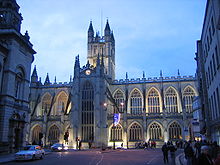- Oliver King
-
Oliver King Bishop of Bath and Wells 
Bath Abbey at sunsetChurch Catholic See Diocese of Bath and Wells In Office 1495–1503 Predecessor Richard Foxe Successor Adriano de Castello Personal details Died 29 August 1503 Previous post Bishop of Exeter Oliver King (c. 1432 – 29 August 1503) was a Bishop of Exeter and Bishop of Bath and Wells who restored Bath Abbey after 1500.
Contents
Life
Educated at Eton and King's College, Cambridge,[1] King became a priest and was appointed Bishop of Exeter on 1 October 1492, consecrated on 3 February 1493.[2] He was then translated to the see of Bath and Wells on 6 November 1495. He died on 29 August 1503.[3]
Restoration of Bath Abbey
King organised the restoration of Bath Abbey after 1500. The story of the refounding is told on the front of the Abbey in carved Bath stone. King had a dream in which he saw a host of Angels on a ladder, the Holy Trinity and an olive tree with a crown on it. He heard a voice:
- 'Let an Olive establish the crown, and let a King restore the Church.'
King believed this was a call for him to support the candidature of Henry Tudor as King, and to restore the Abbey. These images are carved on the West Front of the Abbey with coats of arms of the Montague Family (who paid for the carved wooden doors) and Henry VII's coat of arms. There are also statues of the twelve apostles, including a large statue of St Peter and one of Saint Paul.
Notes
- ^ King, Oliver in Venn, J. & J. A., Alumni Cantabrigienses, Cambridge University Press, 10 vols, 1922–1958.
- ^ Fryde, et al. Handbook of British Chronology p. 247
- ^ Fryde, et al. Handbook of British Chronology p. 228
References
- Fryde, E. B.; Greenway, D. E.; Porter, S.; Roy, I. (1996). Handbook of British Chronology (Third revised ed.). Cambridge: Cambridge University Press. ISBN 0-521-56350-X.
Catholic Church titles Preceded by
Richard FoxeBishop of Exeter
1492–1495Succeeded by
Richard RedmanPreceded by
Richard FoxeBishop of Bath and Wells
1495–1503Succeeded by
Adriano de Castello
This article about a British Catholic bishop or archbishop is a stub. You can help Wikipedia by expanding it.
